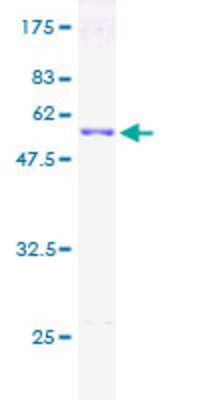SNRPN Products
The protein encoded by this gene is one polypeptide of a small nuclear ribonucleoprotein complex and belongs to the snRNP SMB/SMN family. The protein plays a role in pre-mRNA processing, possibly tissue-specific alternative splicing events. Although individual snRNPs are believed to recognize specific nucleic acid sequences through RNA-RNA base pairing, the specific role of this family member is unknown. The protein arises from a bicistronic transcript that also encodes a protein identified as the SNRPN upstream reading frame (SNURF). Multiple transcription initiation sites have been identified and extensive alternative splicing occurs in the 5' untranslated region. Additional splice variants have been described but sequences for the complete transcripts have not been determined. The 5' UTR of this gene has been identified as an imprinting center. Alternative splicing or deletion caused by a translocation event in this paternally-expressed region is responsible for Angelman syndrome or Prader-Willi syndrome due to parental imprint switch failure.
Show More
14 results for "SNRPN" in Products
14 results for "SNRPN" in Products
SNRPN Products
The protein encoded by this gene is one polypeptide of a small nuclear ribonucleoprotein complex and belongs to the snRNP SMB/SMN family. The protein plays a role in pre-mRNA processing, possibly tissue-specific alternative splicing events. Although individual snRNPs are believed to recognize specific nucleic acid sequences through RNA-RNA base pairing, the specific role of this family member is unknown. The protein arises from a bicistronic transcript that also encodes a protein identified as the SNRPN upstream reading frame (SNURF). Multiple transcription initiation sites have been identified and extensive alternative splicing occurs in the 5' untranslated region. Additional splice variants have been described but sequences for the complete transcripts have not been determined. The 5' UTR of this gene has been identified as an imprinting center. Alternative splicing or deletion caused by a translocation event in this paternally-expressed region is responsible for Angelman syndrome or Prader-Willi syndrome due to parental imprint switch failure.
Show More
Applications: IHC, WB
Reactivity:
Human,
Mouse,
Rat
| Reactivity: | Human, Mouse, Rat |
| Details: | Rabbit IgG Polyclonal |
| Applications: | IHC, WB |
| Reactivity: | Human, Mouse, Rat |
| Details: | Rabbit IgG Polyclonal |
| Applications: | WB |
| Applications: | WB, ELISA, MA, AP |
| Reactivity: | Human |
| Details: | Rabbit IgG Polyclonal |
| Applications: | WB |
| Reactivity: | Human |
| Details: | Mouse IgG Polyclonal |
| Applications: | WB |
| Applications: | WB |
| Applications: | WB |
Applications: IHC, WB, ELISA, ICC/IF
Reactivity:
Human,
Mouse,
Rat
| Reactivity: | Human, Mouse, Rat |
| Details: | Rabbit IgG Polyclonal |
| Applications: | IHC, WB, ELISA, ICC/IF |
Applications: IHC, WB, ELISA, ICC/IF
Reactivity:
Human,
Mouse,
Rat
| Reactivity: | Human, Mouse, Rat |
| Details: | Rabbit IgG Polyclonal |
| Applications: | IHC, WB, ELISA, ICC/IF |
Applications: IHC, WB, ELISA, ICC/IF
Reactivity:
Human,
Mouse,
Rat
| Reactivity: | Human, Mouse, Rat |
| Details: | Rabbit IgG Polyclonal |
| Applications: | IHC, WB, ELISA, ICC/IF |
Applications: IHC, WB, ELISA, ICC/IF
Reactivity:
Human,
Mouse,
Rat
| Reactivity: | Human, Mouse, Rat |
| Details: | Rabbit IgG Polyclonal |
| Applications: | IHC, WB, ELISA, ICC/IF |
Applications: IHC, WB, ELISA, ICC/IF
Reactivity:
Human,
Mouse,
Rat
| Reactivity: | Human, Mouse, Rat |
| Details: | Rabbit IgG Polyclonal |
| Applications: | IHC, WB, ELISA, ICC/IF |
Applications: IHC, WB, ELISA, ICC/IF
Reactivity:
Human,
Mouse,
Rat
| Reactivity: | Human, Mouse, Rat |
| Details: | Rabbit IgG Polyclonal |
| Applications: | IHC, WB, ELISA, ICC/IF |
Applications: IHC, WB, ELISA, ICC/IF
Reactivity:
Human,
Mouse,
Rat
| Reactivity: | Human, Mouse, Rat |
| Details: | Rabbit IgG Polyclonal |
| Applications: | IHC, WB, ELISA, ICC/IF |

![Western Blot: SNRPN Antibody [NBP2-20439] Western Blot: SNRPN Antibody [NBP2-20439]](https://resources.bio-techne.com/images/products/SNRPN-Antibody-Western-Blot-NBP2-20439-img0002.jpg)
![Western Blot: SNRPN AntibodyAzide and BSA Free [NBP2-93476] Western Blot: SNRPN AntibodyAzide and BSA Free [NBP2-93476]](https://resources.bio-techne.com/images/products/SNRPN-Antibody-Western-Blot-NBP2-93476-img0001.jpg)

![Western Blot: SNRPN Antibody [NBP1-74239] Western Blot: SNRPN Antibody [NBP1-74239]](https://resources.bio-techne.com/images/products/SNRPN-Antibody-Western-Blot-NBP1-74239-img0001.jpg)
![Western Blot: SNRPN Antibody [H00006638-B01P] Western Blot: SNRPN Antibody [H00006638-B01P]](https://resources.bio-techne.com/images/products/SNRPN-Antibody-Western-Blot-H00006638-B01P-img0002.jpg)
![Western Blot: SNRPN Overexpression Lysate [NBP2-09906] Western Blot: SNRPN Overexpression Lysate [NBP2-09906]](https://resources.bio-techne.com/images/products/SNRPN-Overexpression-Lysate-Adult-Normal-Western-Blot-NBP2-09906-img0001.jpg)
![Western Blot: SNRPN Overexpression Lysate [NBL1-16296] Western Blot: SNRPN Overexpression Lysate [NBL1-16296]](https://resources.bio-techne.com/images/products/SNRPN-Overexpression-Lysate-Adult-Normal-Western-Blot-NBL1-16296-img0002.jpg)
